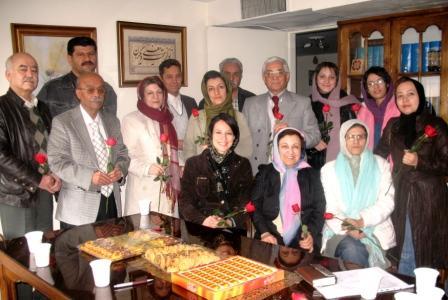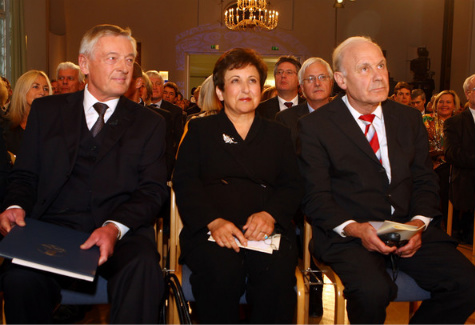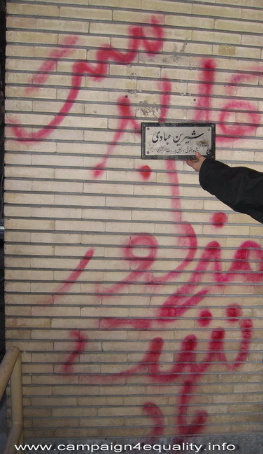Iran Press Watch: The Baha'i Community |
| UK’s top comedians stand up for Bahá’ís in Iran Posted: 25 Feb 2009 04:05 PM PST David Baddiel 15 of Britain’s top comedians have written an open letter calling for the Iranian government to respect the human rights of its citizens, in particular seven leaders of the Bahá’í faith who have been imprisoned for more than eight months and now face spurious charges. In a letter published in today’s edition of The Times (Thursday 25 February), the comedians – including David Baddiel, Bill Bailey, Sanjeev Bhasker, Jo Brand, Rob Brydon, Jimmy Carr, Jack Dee, Omid Djalili, Sean Lock, Alexei Sayle and Meera Syal – say they are concerned for the safety of the seven Bahá’í leaders. “No formal evidence has been brought against them,” says the letter, “They have not been given access to their legal counsel, the Nobel laureate Shirin Ebadi. She has had no access to their files and has suffered threats and intimidation since taking on their case.” Charges that are likely to be filed against the Bahá’ís in the Revolutionary Court include “espionage for Israel, insulting religious sanctities and propaganda against the Islamic republic”. “In reality, their only “crime”, which the current regime finds intolerable, is that they hold a religious belief that is different from the majority,” says the letter.
Sean Lock The prosecution of the leaders is the latest development in a 30-year-long systematic effort orchestrated by the government to eliminate the 300,000 member Bahá’í community in Iran, where the faith began in the mid-19th century. Documentary evidence has been provided by United Nations agencies on this campaign of religious persecution against Iran’s largest non-Muslim religious minority. The seven detained Bahá’ís had been looking after the basic needs of Iran’s 300,000-strong Bahá’í community after all Bahá’í institutions were banned by the Iranian government following the 1979 Islamic revolution. In the absence of any national governing council, the informal group of seven was formed with the full knowledge of the government who had routine dealings with them. “As artists who strive to uplift the human spirit and enrich society through our work,” wrote the comedians, “we register our solidarity with all those in Iran who are being persecuted for promoting the best development of society - be it through the arts and media, the promotion of education, social and economic development, or adherence to moral principles.” “Further, we join with the governments, human rights organizations and people of goodwill throughout the world who have so far raised their voices calling for a fair trial, if not the complete release of the Bahá’í leaders in Iran,” they wrote. The letter has been signed by David Baddiel, Bill Bailey, Morwenna Banks, Sanjeev Bhasker, Jo Brand, Russell Brand, Rob Brydon, Jimmy Carr, Jack Dee, Omid Djalili, Sean Lock, Lee Mack, Alexei Sayle, Meera Syal and Mark Thomas. Read the letter at Times Online (http://www.timesonline.co.uk/ [From a Press Release by the Office of Public Information for the NSA of the Baha'is of the United Kingdom] |
| Be Free by Tara Ellis and Raha Lewis Posted: 25 Feb 2009 02:11 PM PST The Be Free organization was initiated to promote the active involvement of youth for human rights through grassroots new media based campaign. Its first project “Azad Bash” (Be Free) aims to contribute to creating a society of dialogue and openness in Iran by using music to involve Iranian youth. “Be Free” is a music track released recently by well-known singers Tara Ellis and Raha Lewis. Listen to the track here and visit their website (at http://www.befreecampaign.com/
|
| Moral Victory of Iranian Women 30 Years After Posted: 25 Feb 2009 01:46 PM PST by Elahe Amani with Lys Anzia for the Women News Network - WNN WNN Iran Report - 30 years ago, Dr. Shirin Ebadi, the first female judge in Iranian history, was removed from her post when religious authorities in Iran declared that all women serving in the country as judges were “unfit” to perform their duties. She was then immediately demoted to a position as administrative clerk in the courtroom where she once presided. Dr. Ebadi was hit then by the inequities of women’s rights and inequality in Iran, but she did not let that stop her. During a time marked by political and religious upheaval, Shirin Ebadi found her path and continued her journey by becoming a human rights advocate and attorney serving the public as she helped those who looked to her to provide counsel on the interpretation of rights under the Iranian law. In 2003, Dr. Ebadi received the Nobel Peace Prize, “for her efforts for democracy and human rights” as she “focused on the struggle for the rights of women and children.” Almost six years later, in Feb 2009, the struggle to defend human rights in Iran continues. “The issues facing us today are increasingly complex. A certain number of states have ignored the rules of international law to impose relations dominated by force. Domestically, repression is increasingly often gaining the upper hand over the respect of rights and freedoms,” said Ebadi to human rights defenders, FIDH - International Federation of Human Rights. Over the past years, Ebadi has been the target of arrests and assassination attempts, but she is not slowing down. She keeps moving forward. Today she continues, in spite of recent reversals, to represent victims of human rights injustice and discrimination. “I realize that putting so much store in political dialogue seems overly optimistic, given the gulf that exists between the West’s expectations of Iran and the Iranian system’s inclination to compromise. I focus on the political process not because I imagine we will refashion a new relationship around the negotiating table anytime soon but because I see no other options ahead. Iran, for its part, must peacefully transition to a democratic government that represents the will of the majority of Iranians,” said Ebadi in her 2006 book, “Iran Awakening.” Now at the age of 61, her life is in more danger than ever. A sentence for “death” has recently been written by vandals on the walls outside her home and office in Tehran and pinned on her door. But the fearless Iranian human rights lawyer has a deep conviction that, “When you believe in the correctness of your work, there is no reason to be afraid of anything.” Only a few weeks following an invitation to give a series of public lectures for the University of Malaya, the Malaysian Ministry of Foreign Affairs suddenly cancelled Ebadi’s speaking tour. “Dr. Shirin Ebadi is a strong critic (of the Iran government),” said the Ministry. “Her public speaking engagements in Malaysia would cause a disruption of the good relations between the governments of Malaysia and Iran, especially in the field of education,” continued the Ministry’s office. “On the brink of the 10th anniversary of the UN Declaration of Human Rights Defenders and the 60th anniversary of International Declaration of Human Rights it is ironic that the censure of a 2003 Nobel Peace Prize laureate has occurred in Malaysia. Following her censored visit to Malaysia, on Sunday, Dec 21, 2008, plain-clothes and uniformed police and security officials raided the offices of Ebadi’s DHRC - Defenders of Human Rights Center. DHRC staff speculates that the closure was in part on the heels of the UN General Assembly Oct 2008 negative report on Iran’s human rights record. The subsequent complete closure of the DHRC building in Tehran has come as a very hard blow to human rights defenders worldwide. DHRC cases defending women rights activists, prisoners of conscience, journalists and students in Iran have been compromised, along with DHRC documentation of families of prisoners with reports of human rights abuse. In addition to this, the DHRC committee of investigation on fair elections has completely halted its work for the upcoming April elections in Iran. “The closure of DHRC is not just an attack on Shirin Ebadi and her Iranian colleagues, but on the entire international human rights community of which she is an influential and important member,” said Kenneth Roth, executive director of Human Rights Watch. As global human rights are also put to the test in the US with possible new policies in the closing of Guantanamo Bay Detention Camp along with government interests in withdrawal of US troops from Iraq, the record of human rights abuse by the US is also in the global public’s eye. Speaking up for the greater good is ringing throughout global communities. “Thirty years on, some of the worst abuses of the Shah’s time - torture, executions and the suppression of legitimate dissent - are still being replicated in Iran,” said Malcolm Smart, Director of Amnesty International’s Middle East and North Africa Program, “despite the efforts of the country’s growing and valiant community of human rights defenders.” “It is high time that Iranian authorities lived up to their obligations under international human rights law,” added Smart. Dr. Ebadi's torn office placard and threatening graffiti on the facade of her office and home. Photo image: Change4Equality.com On the 30th anniversary of the Iranian revolution, a new and innovative opportunity to address the status of democracy in Iran may be secretly on the mind of many Iranian citizens. Many who participated in Iran’s revolution 30 yrs ago had high hopes for freedom and independence, dignity and rights. But the specific hopes and aspirations of Iranian women were shadowed by despair in the early months of the new Islamic Republic. As new government policies in the post revolution “Spring of Freedom” responded to widespread opposition to the idea of mandatory Islamic dress for women, including requirements to wear the Hijab, relaxation of the codes were not encouraged as Iran’s government took a step back only a few months later. “As long as I am alive, I will do my duty and activities,” she said to the press recently. Exposing Ebadi to higher risks and dangers, her advocacy work on issues related to human rights violations in Iran and her defense in the human rights of Iran’s Baha’i community has placed her in an undeserved dangerous and very precarious position. When Ms. Ebadi received the Nobel Peace prize in 2003, she used the 1.4 million prize money to found and finance the opening of a center for legal rights counsel in Tehran called the DHRC - Defender of Human Rights Center. Recently, in Feb 2008, Ebadi and her family suffered under the weight of Ebadi’s human rights convictions as the government sponsored, IRNA - Islamic Republic News Agency, published a series of articles falsely claiming that she and her daughter, a student at Canada’s McGill University, had converted from Islam to a religion currently considered by the Iranian government to be part of a heretical and unrecognized minority - the Baha’i religion. Leaving the Iranian Islamic State religion is a serious crime in Iran called “apostasy” and being accused of this “crime” cannot be taken lightly. “The penalty for apostasy Kofr (infidelity, blasphemy) under the Iranian criminal code is death,” states Section 5, Article 225-1 of the pending Iran State Penal Code. The drive to formally include apostasy laws and to enact “justice” under the penal code has caused “deep concern” at the United Nations. On the Oct 30, 2008 UN General Assembly’s 63rd session, the Assembly expressed concern about Iran “increasing discrimination and other human rights violations against persons belonging to religious, ethnic, linguistic or other minorities.” Groups recognized as suffering under the report include Arabs, Azeris, Baluchis, Kurds, Christians, Jews, Sufis and Sunni Muslims, as well as Baha’is and their defenders. “Particular attacks on Baha’is and their faith in State-sponsored media, increasing evidence of efforts by the State to identify and monitor Baha’is, preventing members of the Baha’i faith from attending university and from sustaining themselves economically,” along with Baha’i arrests, were also highlighted by the General Assembly. Under government scrutiny and the implication in pending Iranian law on the charges of “apostasy,” Shirin Ebadi and her daughter are clearly facing personal danger with a looming and dangerously real sentence of death. She and her daughter promptly denounced these false accusations in public when Ebadi said, “Threats against my life and security and those of my family, which began some time ago, have intensified.” An anonymous, handwritten threat that Ebadi has received during this time says, “Shirin Ebadi, your death is near.” Oct 2008 threats and harassment against Ms. Ebadi escalated while she was in Germany receiving the “Tolerance Prize” from the Protestant Academy of Tutzing. While receiving the prize, the IRNA - Islamic Republic News Agency warned Ebadi that she was not in favour with Iran’s government officials as they consider her exploiting Iran’s government authority’s “patience and tolerance.” This award was bestowed on her because of her remarks that are contrary to the interests of the Iranian nation,” stated the IRNA in an accusatory public report. Since the revolution, 30 yrs ago, the population of Iran has doubled. 70 percent of all Iranians are the same age, or younger than, those who took part in the revolution. Today, these youth are eager to just “live their lives” and be part of the global community. Out of two million students attending higher education, more than 60% today are women. 30 years ago, of the 100,000 students attending institutions of higher education in Iran, only 17.5% were females. The leadership, creativity and utilization of communication technology by the young women of Iran is setting a vibrant and energetic example for other global social movements. Iran women are now heralding a new global 21st century women’s emancipation. While in western society, young women are often hesitant to claim the identity, or even use the word “feminism,” feminism in Iran has become commonplace in the discourse. Feminism is considered neither taboo nor dreadful. The creation of online human rights journals, “The Feminist School” and “Campaign for Equality” are two examples of this expanding trend. Even as a majority of women receive higher education in Iran today, 30 years after the revolution, women still constitute only 15% of the formal paid labor force. According to the results of the 1385/2006 Iranian census, only 3.5 million Iranian women are salaried workers, compared with 23.5 million men. Female share of the labor force is less than 20%, considerably below the world average of 45%. Slightly over half of all teachers in Iran today are women, but the proportion of female university teaching staff is only 20%, less than that of Algeria (41%), Tunisia (40%), Turkey (38%), and Bahrain (36%). To top this off, less than 4% of employed women are found in senior, executive or managerial positions. The Campaign Against Stoning and All Forms of Violence against Women, The White Scarves Campaign - fighting against gender segregation in Iran stadiums and Kanoon Zanan are all part of a 30 year transcript of a nation where women will no longer take the back seat and accept the inferior position in society. Iranian women writers, novelists, journalists, publishers and movie directors are defining and redefining gender roles and gender relations on a daily basis. In a 21st century re-interpretation of 14th century sharia law the Iranian people, and Iranian women in particular, are claiming moral victory and the beginning of real legitimacy. [Source: Women's News Network at http://womennewsnetwork.net/ |
| Update on the Situation of the Seven Imprisoned Baha’i Leaders Posted: 25 Feb 2009 03:57 AM PST Iran Press Watch has learned through reliable sources on Wednesday, 25 February 2009, that the seven imprisoned Baha’i leaders have been given permission to meet with their families and that their trial has been postponed for 2 weeks. As further updates are made available, Iran Press Watch will bring them to its readers’ attention. |
| No Laughing Matter - Omid Djalili speaks out Posted: 24 Feb 2009 10:40 PM PST Editor’s Note: Omid Djalili is an award-winning British-Iranian actor/comedian. Not only acclaimed as one of Britain’s funniest stand up comedians, he has also featured in films including ‘The Mummy’, ‘Gladiator’, and ‘Casanova’. Omid is also a Baha’i and published the following note on his blog at http://www.omidnoagenda.com/ I need to bring to your attention the following disturbing news: In May 2008 the Iranian Authorities arrested seven leaders of the Baha’i community on trumped up charges of ‘espionage’. The Baha’i Faith is a peace loving world religion but has suffered a great deal of persecution at the hands of the Iranian government simply because they choose to practice their faith in a different way to the majority. It is feared that this week the seven will face very grave consequences. This of course, is unthinkable in this day and age but I assure you is a reality. Some of you may know over 200 Baha’is were executed in the 1980s after the Islamic revolution, not to mention over 20,000 in the 19th Century. Already having been in prison for over 8 months (the men are in a cell with no beds which is a violation of their basic human rights) pressure groups and governments have voiced their concern with formal protests to the Iranian Government. I hope to add to the sense of public outcry with a press release on behalf of the comedy community to get this story the publicity it deserves. My friend Rainn Wilson (an actor on the American version of The Office) has already written a piece for CNN and now I urge you to visit the Amnesty International website and register your complaint via e-mail or fax. Recent press releases on behalf of other action groups as released through the Bahai’s of the UK are here: http://bahainews-uk.info. |




No comments:
Post a Comment